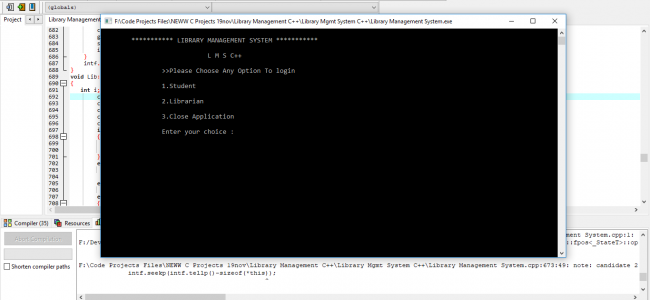Hello everyone!
I have seen some code where some variable gets inserted into string throught the % sign, like so -
- C++ Variable Template
- Variable In Dev C++
- Variables Inside Variables Dev C Online
- C++ & Before Variable
I have tried to look it up in google but I do not know what this is called. What is it and where can I find a reference for it? Thanks!
- 4 Contributors
- forum 5 Replies
- 4,562 Views
- 15 Hours Discussion Span
- commentLatest Postby linux0idLatest Post
For question #2: The variable is allocated once, when the function is called. In fact, from an allocation perspective, it is (nearly) the same as declaring the variable at the beginning of the function. The only difference is the scope: the variable cannot be used outside of the loop. Feb 21, 2020 @azzcatdesign: I'm totally on board with CSS variables! I've got CodePens where I worked out responsive typography, spacers, and containers using global and scoped variables plu with calc. Even took it further with HSL colors and abstracting the separate values to local variables for button colors. The primary difference between const and constexpr variables is that the initialization of a const variable can be deferred until run time. A constexpr variable must be initialized at compile time. All constexpr variables are const. A variable can be declared with constexpr, if it has a literal type and is initialized. C: Variables and Constants Variables are an extremely core concept to most object orientated programming languages. I like to visualize a variable much like a box. We can put things in the box, we can take things out of the box, and at any point we can see what is inside the box.
Nick Evan4,005
('insert into songs values (%Q ,%d, %d, %Q, %Q, %Q, .. ', someInt, someChar, someChar.. )
C++ Variable Template
Do you use someting like sprintf_s()? (or sprintf())
example:
Nov 26, 2015 This works as well for grabbing the player controller without having to cast to the player controller. The only problem you might run into is a situation where you you don't want the 0 index and would need to provide the index of the controller you wish to get.
Variable In Dev C++

The most fundamental of all concepts in C++ is the variable /auto-tune-wav-file.html. — a variable is like a small box. You can store things in the box for later use, particularly numbers. The concept of a variable is borrowed from mathematics. A statement such as
stores the value 1 in the variable x. From that point forward, the mathematician can use the variable x in place of the constant 1 — until he changes the value of x to something else.
Variables work the same way in C++. You can make the assignment
Variables Inside Variables Dev C Online
From that point forward in the execution of the program, the value of x is 1 until the program changes the value to something else. References to x are replaced by the value 1.
C++ & Before Variable
A mathematician might write something like the following: Cooking academy 3 online free no download.
Any reader who’s had algebra realizes right off that the mathematician has introduced the variables x and y. But C++ isn’t that smart. (Computers may be fast, but they’re stupid.)
You have to announce each variable to C++ before you can use it. You have to say something soothing like this:
These lines of code declare that a variable x exists, is of type int, and has the value 10; and that a variable y of type int also exists with the value 5. You can declare variables (almost) anywhere you want in your program — as long as you declare the variable before you use it.